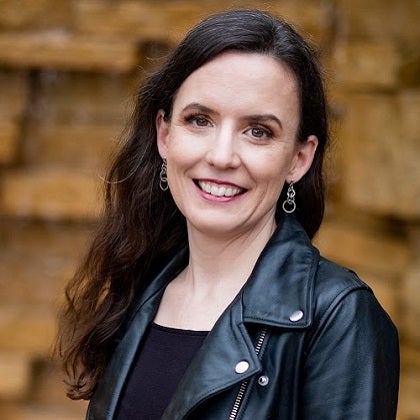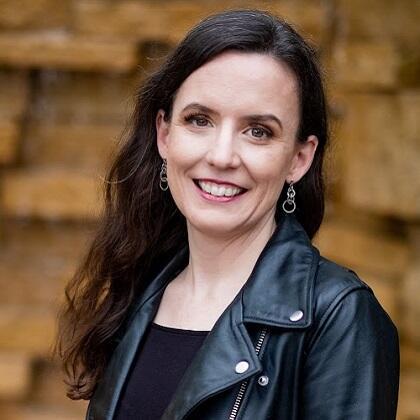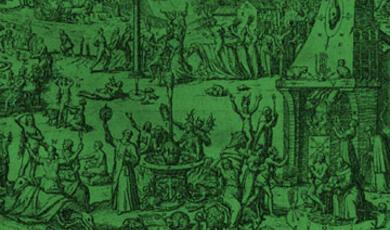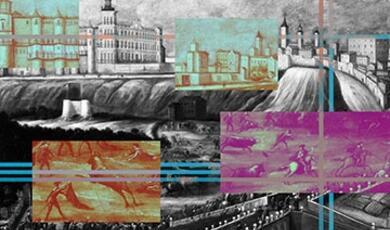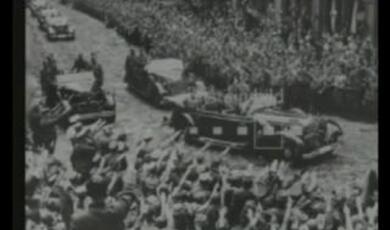19th-Century Eclipse Expeditions
Share
- Details
- Text
- Audio
- Downloads
- Extra Reading
During the late 19th century, British and American organisations such as the US Coast Survey, the Royal Society, and the Royal Astronomical Society, as well as individuals like Elizabeth Brown and James Gilliss, planned expeditions to observe a total solar eclipse. These high-stakes astronomical expeditions involved many scientific practitioners whose collective eclipse experience helped to grow and sustain 19th-century mathematical communities. Especially in the United States, connections and friendships forged beneath the sun’s shadow sparked creative ideas, set in motion new journals, and helped establish a precedent for government funding for maths there.
This was the key-note talk in the 2023 BSHM event, Astronomy and the Forging of Mathematical Communities.
There is no text for this event
© Dr Laure Miolo 2023
References
1 See P. L. Lucas, From Author to Audience. John Palgrave and Medieval Publication (Dublin, 1997), pp. 1–2, 249–280; P. Bourgain, ‘À la recherche des caractères propres aux manuscrits d'auteur médiévaux latins’, Bibliothèque de l'École des chartes, 71 (2013), 185–198.
2 C. Mews, ‘Communautés de savoirs. École et collèges à Paris au XIIIe siècle’, Revue de Synthèse, 129/6, n.4 (2008), 485–507.
3 C. Mews and J. N. Crossley, ‘Introduction’, in Communities of Learning: Networks and the Shaping of Intellectual Identity in Europe 110-1500, ed. by C. Mews and J. N. Crossley (Thurnhout, 2011), pp. 1–8 (p. 1).
4 See J. A. Weisheipl, ‘Curriculum of the Faculty of Arts of Oxford in the early fourteenth century’, Mediaeval Studies, 26 (1964), 143–185; G. Beaujouan, ‘Le quadrivium et la faculté des arts’, in L'enseignement des disciplines à la faculté des arts (Paris et Oxford, XIIIe-XVe siècles), ed. by O. Weijers and G. Holtz (Turnhout, 1997), pp. 185–194.
5 O. Pedersen, ‘The Corpus astronomicum and the traditions of Medieval Latin Astronomy’, Studia Copernicana, 13 (1975), 57–96.
6 C. Lafleur, ‘La réglementation ‘curriculaire’ (de forma) dans les introductions à la philosophie et les guides de l’étudiant de la Faculté des arts de Paris au XIIIe siècle : une mise en contexte’, in Weijer and Holtz, 1997, pp. 521-559.
7 J-P. Boudet, ‘A college of astrology and medicine? Charles V, Gervais Chrétien, and the scientific manuscripts of Maître Gervais’s College’, Studies in History and Philosophy of Biological and Biomedical Sciences 41 (2010), 99–108.
8 C. P. E. Nothaft, ‘Critical Analysis of The Alfonsine Tables in the Fourteenth Century: The Parisian Expositio Tabularum Alfonsii of 1347’, Journal for the History of Astronomy, 46 (2015), 76–99.
9 C. Chabás and B. R. Goldstein, ‘Early Alfonsine Astronomy in Paris: the Tables of John Vimond (1320)’, Suhayl 4, 207–294.
10 L. Miolo, ‘In quest of Jean des Murs’s library: An oveview of his readings and uses of manuscripts’, Erudition and the Republic of Letters, 4 (2019), 13–39.
11 H. Carey, Courting disaster: Astrology at the English Court and Universities in the late Middle Ages (Houndmills- London, 1992), pp. 58-78.
12 See also C. P. E. Nothaft, ‘Criticism of trepidation models and advocacy of uniform precession in Medieval Latin astronomy’, Archives for History of Exact Science, 71 (2017), 211–244 (p. 232).
13 R. Kremer, M. Husson and J. Chabás, Alfonsine Astronomy: The Written Record (Turnhout, 2022); C. P. E. Nothaft, ‘A new series on Alfonsine Astronomy’, Journal for the History of Science, 54:1 (2023), 113–118.
14 E. Poulle, ‘Jean de Murs et les tables alphonsines’, Archives d'Histoire Doctrinale et Littéraire du Moyen Âge, 47 (1980), 241–271; M. Husson, ‘L’astronomie alphonsine dans l’Expositio intentionis regis Alfonsii circa tabulas ejus de Jean de Murs’, Archives d'Histoire Doctrinale et Littéraire du Moyen Âge, 1:78 (2011), 229–245.
15 See M. Husson et M-M. Saby, ‘Le manuscrit Erfurt F. 377 et l'astronomie parisienne’, in Les miscellanées scientifiques au Moyen Âge, ed. by A. Paravicini-Bagliani (Florence, 2019), 205–234.
16 L. Miolo, ‘Retracing the Tradition of John of Genoa’s Opus astronomicum through extant manuscripts’, in R. Kremer et al. 2022, 343-380.
17 J-P. Boudet and L. Miolo, ‘Alfonsine Astronomy and Astrology in Fourteenth-century Oxford: The Case of MS Bodleian Library Digby 176’, , in R. Kremer et al. 2022, 57–106.
18 It is a tempting hypothesis proposed in: K. Snedegar, ‘The Works and Days of Simon Bredon. A Fourteenth-Century Astronomer and Physician’, in Between Demonstration and Imagination: Essays in the History of Science and Philosophy, presented to John D. North, ed. L. Nauta and A. Vanderjagt (Leiden-Boston: Brill, 1999), 285–309.
© Dr Eva Kaufholz-Soldat 2023
1 Klumpke, 1899b, p. 299.
2 (“personnes qui se destinent à l’enseignement des sciences, aux voyages ou qui ont le goût de l’Astronomie”) (Mouchez, 1879, quotation on pp. 18-19).
References and Further Reading
Aubin, David, Bigg, Charlotte Bigg, and Sibum, H Otto (eds). The heavens on earth: Observatories and astronomy in nineteenth-century science and culture. Duke University Press 2010, pp. 86–117.
Brück, Mary (2009). Women in early British and Irish astronomy. Springer.
Crossley, Leslie Mary. The professionalisation of science in Victorian Britain. Diss. UNSW Sydney, 1979.
Greenwood, Jeremy JD. "Citizens, science and bird conservation." Journal of Ornithology 148.Suppl 1 (2007): 77-124.
Höhler, Sabine. Luftfahrtforschung und Luftfahrtmythos: Wissenschaftliche Ballonfahrt in Deutschland, 1880-1910. Vol. 792. Campus Verlag, 2001.
Kaufholz-Soldat, Eva. " ”All manner of gymnastic evolutions” for Science. Dorothea Klumpke and a Life in Astronomical Research.“ Special Issue of Endeavour zum Thema „Calculating Couples: Domesticity and Gender in the Making of Mathematical Careers“, ed. von Brigitte Stenhouse und David Dunning. To be published at the end of 2023.
Klumpke, Dorothea. „La Femme dans l’astronomie”. In: Bulletin de la Societe Astronomique de France et Revue Mensuelle d’Astronomie, de Meteorologie et de Physique du Globe 13, 1899, pp. 206–215.
Lankford, John. American astronomy: community, careers, and power, 1859-1940. University of Chicago Press, 1997.Morrell, J. B. (2006). “Professionalisation”. In: Geoffrey N Cantor et al. (eds) Companion to the history of modern science. Routledge, pp. 980–989.
Le Lay, Colette. "Du côté des lettres: Benjamin Baillaud et les femmes astronomes (1922)." Images des Mathématiques. https://images.math.cnrs.fr/Du-cote-des-lettres-Benjamin-Baillaud-et-les-femmes- astronomes-1922.html?lang=fr . 2019
Mack, Pamela Etter (1977). Women in astronomy in the United States 1875-1920. Harvard University Press.
Mehrtens, Herbert, Henk JM Bos, and Ivo Schneider, eds. Social history of nineteenth-century mathematics. Boston: Birkhäuser, 1981.
Ogilvie, Marilyn Bailey (2000). “Obligatory amateurs: Annie Maunder (1868–1947) and British women astronomers at the dawn of professional astronomy”. In: The British Journal for the History of Science 33 (1), pp. 67–84.
Rossiter, Margaret W. Women scientists in America: Struggles and strategies to 1940. Vol. 1. JHU Press, 1982.
Schiebinger, Londa. The mind has no sex?: Women in the origins of modern science. Harvard University Press, 1991.
Tucker, Jennifer. "Voyages of Discovery on Oceans of Air: Scientific Observation and the Image of Science in an Age of" Balloonacy"." Osiris 11 (1996): 144-176.
© Dr Deborah A Kent 2023
1 In 1869, $5000 now has a current economy cost of just over $17,000,000 and $2000 in 1869 has a current economy cost of about $6,800,000. Measuringworth.com
References and Further Reading
Baron, David. American Eclipse: A Nation's Epic Race to Catch the Shadow of the Moon and Win the Glory of the World. 2017.
Baron, David. “You Owe it to Yourself to Experience a Total Solar Eclipse.” TED x Mile High, 2017. Yhttps://www.ted.com/talks/david_baron_you_owe_it_to_yourself_to_experience_a_total_solar_eclipse?lan guage=en
Beckles, Joel and Deborah Kent. “Eclipsed by history: underrecognized contributions to early British solar eclipse expeditions.” Notes and Records 2023, https://doi.org/10.1098/rsnr.2023.0001
Briers, Megan, Mixie Billina, and Deborah Kent. “Chasing change: the lasting legacy of India’s 1871 eclipse.” Astronomy & Geophysics 2022, 63 (1), pp 1.24-1.29. https://doi.org/10.1093/astrogeo/atac010
Eclipsewise. https://www.eclipsewise.com/
Great American Eclipse. https://www.greatamericaneclipse.com/
The history and science of total solar eclipses. https://eclipse-history.wp.st-andrews.ac.uk/
Kent, Deborah. “The curious aftermath of Neptune’s discovery.” Physics Today 2011, 64 (12), pp 46-51. https://doi.org/10.1063/PT.3.1363
Kent, Deborah. “The North American eclipse of 1869.” Physics Today 2019, 72 (8), pp 46-53. https://doi.org/10.1063/PT.3.4271
Leveson, Thomas. The Hunt for Vulcan: And How Albert Einstein Destroyed a Planet, Discovered Relativity, and Deciphered the Universe. 2015.
Mr Eclipse. https://www.mreclipse.com/
Standage, Tom. The Neptune File: A Story of Astronomical Rivalry and the Pioneers of Planet Hunting. 2000.
This event was on Wed, 18 Oct 2023
Support Gresham
Gresham College has offered an outstanding education to the public free of charge for over 400 years. Today, Gresham College plays an important role in fostering a love of learning and a greater understanding of ourselves and the world around us. Your donation will help to widen our reach and to broaden our audience, allowing more people to benefit from a high-quality education from some of the brightest minds.


 Login
Login
